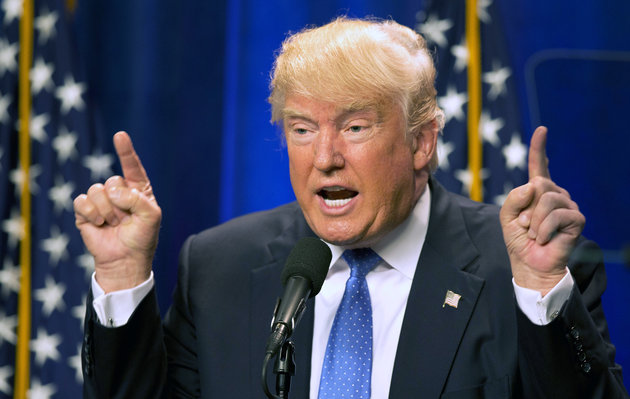
WASHINGTON — Donald Trump ramped up his earlier call to ban Muslims from entering the country in a high-profile national security address on Monday — and made clear he believes he can do it with or without congressional approval.
“The immigration laws of the United States give the president powers to suspend entry into the country of any class of persons,” Trump told a small audience at St. Anselm College in New Hampshire. “I will suspend immigration from areas of the world where there is a proven history of terrorism against the United States, Europe or our allies, until we fully understand how to end these threats.”
Trump’s promise to act unilaterally comes at the precise moment that GOP leaders in both the House and Senate are trying to rally Republicans behind their controversial presidential nominee-to-be with arguments that Congress could check his impulses.
Trump had given them a bit of room to make such assertions by calling his Muslim ban idea more of a suggestion in mid-May. On Monday, however, he went in the opposite direction, saying that he wanted to target Muslim countries outside the Middle East and that he’d lean on Muslim communities in America to cooperate with law enforcement. The more aggressive tone and platform came just a day and a half after 49 people were gunned down in a gay nightclub in Orlando, Florida, by the son of Afghan immigrants who, moments before opening fire, called 911 to declare his loyalty to the Islamic State terror group.
How Republican leaders in Congress will react to Trump’s most recent remarks is unclear.
Two weeks ago, Senate Majority Leader Mitch McConnell (R-Ky.) told CBS News, “No matter how unusual a personality may be who gets elected to office, there are constraints in this country. You don’t get to do anything you want to.”
“I don’t have a new response today,” said McConnell spokesman Don Stewart on Monday, when asked for a comment on Trump’s latest comments.
House Speaker Paul Ryan (R-Wis.) has similarly argued that Trump would be restrained in office by the system of checks and balances in American governance. His office did not respond Monday to the question of whether Ryan felt the Muslim ban that Trump now envisions is something that would have to be approved by Congress.
Both McConnell and Ryan have said they oppose a ban on Muslims.
If it is bad for Obama to do it, then it is bad for Trump to do it.
-Legal scholar Richard Epstein on Trump’s assertion of immigration power
Legal scholars noted the irony of the presumptive Republican nominee adopting a broad view of executive power on matters of immigration at a time when House Republicans are suing President Barack Obama for utilizing similar legal authority. Obama has argued that federal law allows the president to prioritize certain categories of individuals for deportation. Trump is arguing that the law gives the president that same power in determining entry.
“If it is bad for Obama to do it, then it is bad for Trump to do it,” said Richard Epstein, a longtime libertarian-minded law professor at the University of Chicago and now a well-regarded legal scholar at New York University.
He added, “Obama has a more generous soul on these questions than Trump, who is slightly crazy. But after yesterday’s killing, the gun-control solution will fall on deaf ears. ... I think Trump will score points on this round. That’s my sense as somebody who loathes the man.”
Trump’s original call for a Muslim ban, made shortly after a Muslim husband and wife murdered 14 people at a county government office in San Bernardino, California, proved enormously popular with Republican primary voters. The real estate mogul often attributed his rise in the polls to that stance, which at the time was criticized by a number of his primary rivals.
Last month, Trump’s chief strategist, Paul Manafort, told The Huffington Post that the candidate has “already started moderating” on the Muslim ban. But Trump’s half-hour speech showed no indication that would happen in the foreseeable future.
He accused Obama and all-but-certain Democratic nominee Hillary Clinton of refusing to use the phrase “radical Islam” out of an insistence on political correctness — and made a point of using “radical Islam” and its related adjective form nearly two dozen times. (Obama and Clinton, like former President George W. Bush, have made a point of distinguishing Islam and its billion-plus followers from the much, much, much smaller number of terrorists who justify their acts through a harsher interpretation of that faith.)
“I want every American to succeed, including Muslims. But the Muslims have to work with us. They have to work with us. They know what’s going on. They know that he was bad,” Trump said of the Orlando attacker. “They knew the people in San Bernardino were bad. But you know what? They didn’t turn them in.”
He did not provide any evidence that unnamed Muslims knew the shooters in Orlando or San Bernardino were planning violent attacks.


